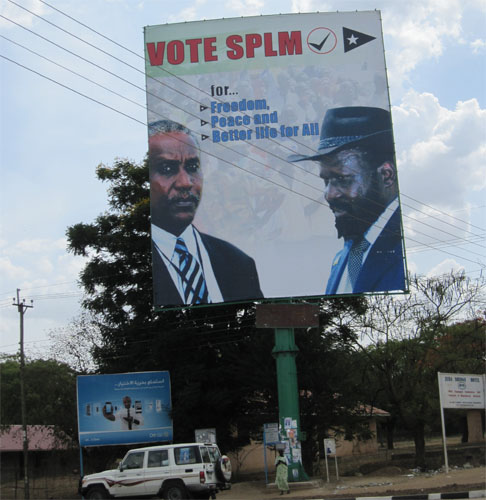
The run-up to next week’s nationwide election in Sudan has been marked by political twists and turns, late-night announcements, conflicting reports, and an overall atmosphere of uncertainty and confusion surrounding the basic questions, such as:
“WHO [will participate], WHEN [will the polling period begin and end], and WHAT [are the political motivations of the ruling NCP and SPLM parties and of the opposition, and what back-door deals have occurred]”?
If you are a Sudan watcher, every day (and night) in recent memory has been marked with a new and potentially game-changing development. Late last night, the Umma Party announced its all-out boycott of the election. The night before, the SPLM declared it will boycott all levels of the elections in 13 of the 15 northern states.
While it may be an exercise in futility, it’s hard not to engage in some speculation about possible scenarios during the polls (still set to kick off on Sunday) and in their aftermath. An article posted yesterday on the Sudan Tribune’s website was cause for some stir among politicos in Juba:
Withdrawn SPLM candidate violated Elections Act, says NEC
Citing section 45 (3) of the 2008 Act, the NEC official said, "The candidate shall not withdraw her/his nomination after the period specified in section (1) and his name shall be included on the ballot paper and any vote cast for him/her on polling day shall be deemed valid".
Asked about the implications of Mr. Arman winning the elections after he withdrew from the race, yet his name remained on the ballot paper, Ms. Kide said the SPLM candidate will then be declared winner of the presidential elections.
"Since Yasir Arman’s name has already been printed on the ballot papers, some of his supporters will still vote for him and if he gets majority votes, NEC will have to officially declare him the President of the republic," she told Sudan Tribune yesterday.
That’s correct—Yasir Arman could still receive votes for the national presidency because his name is on the ballot and, as the NEC official notes, some of his supporters may still opt to vote for him for a number of reasons:
– Because many of the major opposition parties are boycotting and have left the people with little choice besides Bashir on the Presidency ballot.
– Because at rallies across the South (and in some areas of the North), the SPLM has clearly instructed its supporters to “vote for the star,” the symbol of the SPLM, on the ballot.
– Because the news of the SPLM’s withdrawal of Yasir Arman from the presidential race may not have reached Sudan’s vast “periphery”—the rural and remote areas where cell phone and radio coverage is somewhere between minimal and nonexistent.
…And the list could go on. So in the “Department of It Could Happen,” Yasir Arman still stands a chance of garnering votes against war criminal President Bashir, even if his party no longer wishes him to be in the race. This morning in one of the bustling markets of Juba, I noticed that a number of shopkeepers were still displaying posters of Yasir Arman and his Obama-inspired slogans of “hope and change.” The SPLM’s decision to withdraw Yasir was pure politics and pragmatism; the question of whether news of this choice by the South’s political elites has trickled down to its largely rural constituents remains open.
P.S.: Great commentary by Khartoum-based Reuters correspondent Opheera McDoom, a seasoned Sudan journalist who sheds light for outsiders on what she calls in her blog post “the chaos of covering politics here.”

